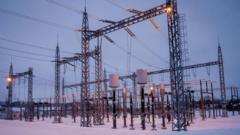As the Baltic states embrace a new chapter in energy autonomy, concerns rise over potential Russian retaliation amidst recent sabotage incidents.
Baltic States Shift Power Grid to EU, Bid Farewell to Russian Dependency

Baltic States Shift Power Grid to EU, Bid Farewell to Russian Dependency
Estonia, Latvia, and Lithuania mark a historic transition by disconnecting from Russia's electricity grid to join the EU network, enhancing security and independence.
The Baltic states of Estonia, Latvia, and Lithuania have officially severed ties with Russia’s electricity grid, aligning with the European Union’s power network in a transformative move celebrated as a milestone for regional security and independence. This strategic shift, which has been in development since 2007, gained urgency following Russia's invasion of Ukraine in 2022.
At a ceremonial event in Vilnius, Lithuania, EU Commission President Ursula von der Leyen declared, “Today, history is made. This is freedom — freedom from threats, freedom from blackmail.” Polish President Andrzej Duda echoed this sentiment, noting the shift as a "truly symbolic moment" aimed at enhancing the security and resilience of the area.
For years, the three Baltic nations relied on the Brell power grid, which is predominantly controlled by Moscow, a structure that made them vulnerable to energy manipulation. Even after ceasing electricity purchases from Russia in 2022, their connection to the Brell system left them reliant on Russian energy flows.
In light of recent damaged cables and potential sabotage linked to Russian activity in the Baltic Sea, Ms. von der Leyen cautioned that NATO must stay vigilant against possible retaliatory actions from Moscow.
The transition, which required an investment of approximately 1.6 billion euros, largely funded by the EU, unfolded over two days. The Baltic nations temporarily functioned as an "energy island" before fully integrating with the EU grid. Ukrainian Energy Minister German Galushchenko recognized the importance of this development for the entire European continent.
Concerns linger about security, as recent maritime incidents indicate a troubling pattern. Lithuania's President Gitanas Nauseda has called for sanctions against Russia's shadow fleet, highlighting the risks to critical infrastructure. While NATO has refrained from directly blaming Moscow, it has initiated an enhanced patrol mission in the region, titled Baltic Sentry, to safeguard vital undersea cables.




















